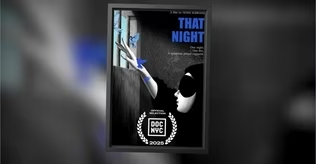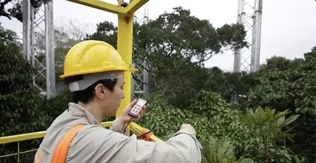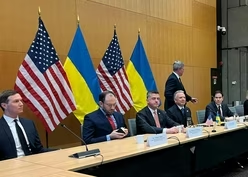
Federal agents escalate immigration crackdown tactics
Clip: 11/23/2025 | 6m 15sVideo has Closed Captions
Federal agents escalate tactics as Trump administration pushes for more migrant arrests
From Los Angeles to Chicago to Charlotte, federal law enforcement agents are arresting immigrants in raids unfolding in the public eye. Videos circulating online show agents pinning protesters to the ground, smashing car windows and dragging suspected undocumented immigrants away from their families. Ali Rogin speaks with Wall Street Journal immigration reporter Michelle Hackman for more.
Problems playing video? | Closed Captioning Feedback
Problems playing video? | Closed Captioning Feedback
Major corporate funding for the PBS News Hour is provided by BDO, BNSF, Consumer Cellular, American Cruise Lines, and Raymond James. Funding for the PBS NewsHour Weekend is provided by...

Federal agents escalate immigration crackdown tactics
Clip: 11/23/2025 | 6m 15sVideo has Closed Captions
From Los Angeles to Chicago to Charlotte, federal law enforcement agents are arresting immigrants in raids unfolding in the public eye. Videos circulating online show agents pinning protesters to the ground, smashing car windows and dragging suspected undocumented immigrants away from their families. Ali Rogin speaks with Wall Street Journal immigration reporter Michelle Hackman for more.
Problems playing video? | Closed Captioning Feedback
How to Watch PBS News Hour
PBS News Hour is available to stream on pbs.org and the free PBS App, available on iPhone, Apple TV, Android TV, Android smartphones, Amazon Fire TV, Amazon Fire Tablet, Roku, Samsung Smart TV, and Vizio.
Providing Support for PBS.org
Learn Moreabout PBS online sponsorshipALI ROGIN: From Los Angeles to Chicago and now Charlotte, North Carolina, federal law enforcement agents are arresting immigrants, both legal residents and undocumented, in raids unfolding in the public eye.
Videos circulating online show agents pinning protesters to the ground, smashing the windows of cars and dragging suspected undocumented immigrants away from their families.
For more on these escalating tactics, we're joined by Michelle Hackman, immigration reporter for the Wall Street Journal.
Thank you so much for joining us.
So what are these tactics that law enforcement are using now in these immigration operations?
And how do they differ from what they've done in the past?
MICHELLE HACKMAN, The Wall Street Journal: Yeah.
So I would say there are two really big differences.
One is that at the start of the Trump administration, the decision they made, you know, in the past when ICE would do an arrest, they were interested in doing numbers.
And the easiest way to make an arrest is to catch someone basically as they're coming out of jail.
Well, this administration made a calculated decision that, you know, they believe that a lot of immigrants are out there in the country.
They call them fugitives.
And so they're doing a lot more street arrests, which means they're tracking people down where they live, where they're dropping their kids off at school.
And that's leading to a lot of confrontations that we just used to not see before.
ALI ROGIN: And those confrontations are happening not just with the people they're targeting, but certainly the surrounding crowds, passersby who become onlookers how is that working out?
MICHELLE HACKMAN: Yeah, so we've seen these huge deployments of Border Patrol agents.
You know, typically, we're typically at the border and not used to dealing with crowds and protesters, and suddenly they're deployed in these big cities like Chicago.
I'm sure viewers have seen, you know, and crowds of protesters don't love this huge law enforcement presence in their communities.
And so they've been coming out protesting, you know, peacefully protesting.
And there have been a lot of instances where you've seen law enforcement like, you know, basically throw pepper balls at people's heads, use tear gas.
And it's gotten to the point where a judge even ruled at one point, like, you cannot tear gas or throw pepper balls at someone's head unprovoked.
ALI ROGIN: And what sort of training are these officers getting if they've previously only really done service at the border, what sort of training are they getting before they're deploying to these more densely populated areas?
MICHELLE HACKMAN: I don't believe that there's any special training.
You know, one thing that's interesting is that we think of the people doing these arrests as ICE, but actually what this administration has done is they've taken people from all over the government, you know, primarily the Border Patrol, but also FBI agents, DEA agents, who are getting at most a two-week crash course in immigration and are not being sort of given the really detailed training that ICE officers get that involves dealing with, you know, resistance and protesters.
And, you know, you make an arrest, people will try to run away.
They don't get all that.
ALI ROGIN: And you've also covered the disagreements that are happening between ICE, Immigration and Customs Enforcement, and Border Patrol officers who are really following the lead of Homeland Security Secretary Kristi Noem, who's really advocating for these stronger, more aggressive measures.
What is that internal debate?
How is that playing out?
MICHELLE HACKMAN: Yeah, so it's really interesting.
It's over tactics, I would say, if I were to boil it down.
So ICE officers are, I mean, almost like trained police.
And when they go to make an arrest, they typically will do some advance work.
You know, is this person actually in the country illegally?
Where do they live?
What's the best time of day to go get them?
And it's not that those don't ever lead to confrontations, they often do.
But what we've seen these Border Patrol agents in these big cities in Los Angeles, Chicago, you know, just this past couple of weeks, they've been in Charlotte, North Carolina.
What they do is they actually use profiling tactics.
I mean, they talk about this.
Is the person speaking Spanish?
Do they look scared?
You know, do they work in a job that is typically held by an immigrant in the country illegally?
And then they'll go and they'll basically check, is this person here illegally?
And then do the arrest.
ALI ROGIN: How effective are these new tactics that are being used at achieving the administration's goal of deporting the maximum amount of people they can?
MICHELLE HACKMAN: Yeah, it's a really good question.
And I think people at ICE feel frustrated because when, you know, when you're using almost like a profiling tactic to make arrests, it's sloppy, it's scattershot.
You end up taking in a lot of people who maybe are immigrants but have some kind of legal status that's preventing them from being deported.
Maybe they're a U.S.
citizen.
You know, that's why we've heard a lot more cases of U.S.
citizens being detained for a few hours before they get released.
And so they are making a lot of arrests, but a lot of those people tend get.
Tend to get released, don't ultimately get deported.
I think on the flip side, though, the thing that this administration really loves about these tactics is that they're really public and they're very scary, and it's driving a lot of people to say, you know what?
It's not worth it.
I'm too scared.
I don't want to wait for ICE to come arrest me in front of my child.
I think I'm going to make arrangements to leave the country myself.
ALI ROGIN: And so what is the effect on immigrants, both documented and undocumented, as well as the communities that they live in?
MICHELLE HACKMAN: There is, I would say, pretty widespread terror.
And not just, you know, not just the immigrants themselves.
I would say people who are watching these arrests happen there.
We've heard from a lot of bystanders in places like Chicago and Charlotte, you know, be like, you know, this arrest was made in my front yard.
This is really scary.
You know, I don't know what's happening.
I don't know why someone's attacking my rights like this.
And we've also seen sort of resistance pop up where, like, you know, people will walk around neighborhoods and hand out whistles to make sure, you know, if you see Border Patrol start whistling.
So the immigrants nearby know that it's not safe.
They need to go hide.
ALI ROGIN: Michelle Hackman with the Wall street journal.
Thank you so much.
MICHELLE HACKMAN: Thank you.
New film tells story of woman who survived Iran prison fire
Video has Closed Captions
Clip: 11/23/2025 | 5m 39s | New film ‘That Night’ tells story of woman who survived fire at infamous Iranian prison (5m 39s)
Scientists build ‘time capsule’ to predict climate future
Video has Closed Captions
Clip: 11/23/2025 | 2m 17s | Deep in the Amazon, scientists build a ‘time capsule’ to predict future of climate change (2m 17s)
Ukraine and allies respond to peace plan at Geneva talks
Video has Closed Captions
Clip: 11/23/2025 | 6m 42s | Officials meet in Geneva for Ukraine talks as peace plan’s author called into question (6m 42s)
Providing Support for PBS.org
Learn Moreabout PBS online sponsorship
- News and Public Affairs

FRONTLINE is investigative journalism that questions, explains and changes our world.

- News and Public Affairs

Amanpour and Company features conversations with leaders and decision makers.












Support for PBS provided by:
Major corporate funding for the PBS News Hour is provided by BDO, BNSF, Consumer Cellular, American Cruise Lines, and Raymond James. Funding for the PBS NewsHour Weekend is provided by...



